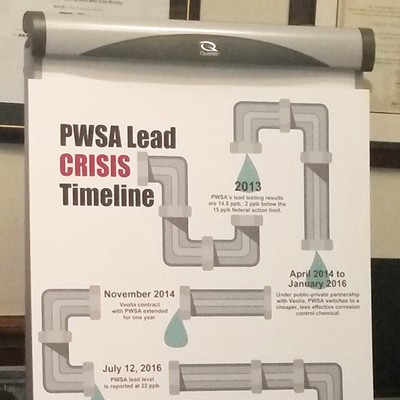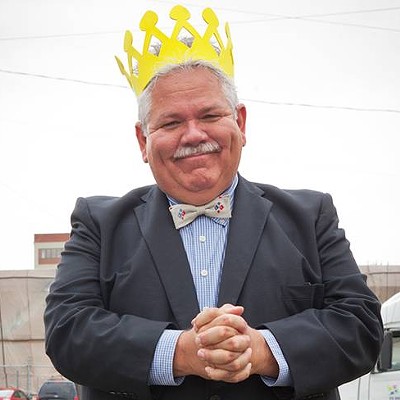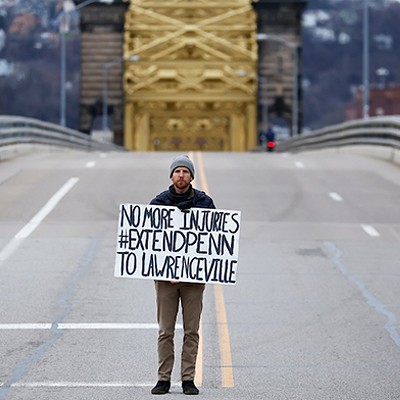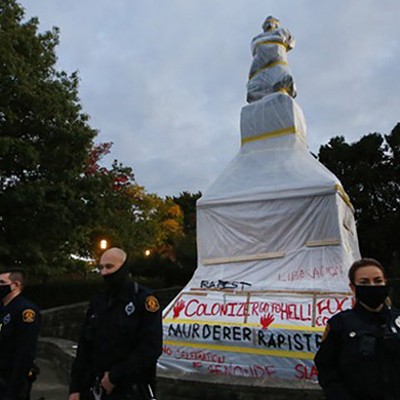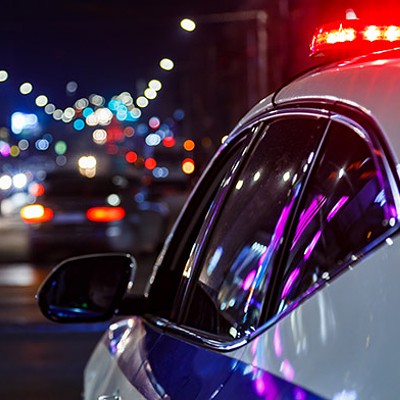Wednesday, March 29, 2017
Bike-advocacy group takes issue with mayoral candidate John Welch's comments on bike lanes
On March 24, Pittsburgh mayoral candidate John Welch issued a new campaign ad claiming that Mayor Bill Peduto had “misplaced priorities.” Welch said in a Facebook post adjoining the ad that Peduto is “putting bike lanes over the health of city residents.”
“Now I like bike lanes, but not that many people use them, but we all rely on clean and safe drinking water,” said Welch in the ad. “So for me it is a matter of priorities, and we can see now that his priorities are not our priorities.”
The bike advocates at Bike Pittsburgh take issue with Welch’s assertion. Scott Bricker, director at Bike Pittsburgh, wrote in an email to Pittsburgh City Paper that bike lanes serve a public-health need, as they provide safe passage for city cyclists and encourage people to ride and stay fit.
“Both funding for bike infrastructure and funding for clean drinking water are expenditures to keep Pittsburghers healthy and safe,” wrote Bricker. “Pitting one against the other is bad policy. Using the City's bike infrastructure budget isn't a real solution to the lead problem and Mr. Welch knows it.”
In fact, at a March 28 press conference, Allegheny County Controller Chelsa Wagner estimated the cost of replacing all the lead-service lines in the city could be around $25 million. And according to capital budget figures since Peduto came into office in 2014, his office has allocated — but not spent all of — about $216,000 a year in city bonds and funds towards bike-related projects. According to Bike Pittsburgh’s calculations, it would take 125 years to solve the city’s lead-water-pipe problems using bike funds at the level they are typically spent.
(Side note: Local news sources tend to write stories about how the city is allocating millions of dollars in funds for bike lanes. But according to the city's past four capital budgets, often not all of that money is spent because the projects never materialize; the funds are then carried over to the next year. Also, many news stories fail to mention that the bulk of bike-land funding in Pittsburgh consists of state and federal grants awarded to the city.)
Bricker wrote that Bike Pittsburgh also believes the city should tackle its lead problems, but said it’s not fair to pin those problems on bike-infrastructure funding.
“We’ve known lead has been a problem for human health for generations,” wrote Bricker. “But people should know that you just can’t solve this lead problem by taking away money for safe streets. There’s nowhere near enough money. What little money does exist for bike lanes is used to leverage state and federal transportation dollars which cannot be used to replace lead service lines.”
In a blog posted on Welch’s campaign website, Welch wrote, “As mayor of the city of Pittsburgh, I would work hard to ensure that the public health of the residents of our city rises to the highest priority possible. We deserve better as we strive to be a city where all can flourish.”
However, Welch hasn’t shared publicly what his specific plans would be to address the lead issue. At a March 22 press conference, when asked by reporters about his plan for restructuring PWSA to mitigate the lead issue and other problems, Welch told reporters to ask him again on May 17, the day after the upcoming primary election.
Bricker wrote that he feels Welch is using bike lanes as a “wedge issue” to take advantage of Pittsburgh voters who don’t fully understand the reasoning behind bike lanes. Bricker cites Downtown's Penn Avenue lane as a success story. The lane sometimes hosts more than 1,000 trips per day, and Bricker says about one quarter of morning traffic on the street is bike traffic. He also wrote the redesign of Penn Avenue Downtown has helped eliminate bottlenecks at the 16th Street Bridge and at 11th and 9th streets.
“He knows what he's doing,” wrote Bricker of Welch. “He's trying to score political points.”
Bricker asserted that Bike Pittsburgh doesn't endorse political candidates, but the group does encourage its members to vote. This year, Bike Pittsburgh is continuing its mayoral-petition program called “I Bike. I Walk. I Vote,” which asks people to sign petitions calling on candidates to pledge to make commitments to bike- and pedestrian-friendly policies. Bricker wrote that in 2013, Bike Pittsburgh garnered 3,000 signatures, with 80 percent of respondents being registered voters. Bricker noted that Peduto won election that year by only about 5,000 votes.
Of people who signed the petition, Bricker wrote, “They're educated and very civically engaged."
Update: Welch responded a day after the article was published with an email to CP writing "I specifically stated that I had no problem with bike lanes and even said as much in a private conversation with Scott Bricker. I want to set the record straight. I congratulate [Bike Pittsbugh] for standing up for bicyclists but who is standing up for city residents who rely on PWSA for safe drinking water?"
Welch then goes on in the email to accuse Bike Pittsburgh of selfishness writing "how dare [Bike Pittsburgh] make this issue about themselves?" and claiming that Bricker was defending Peduto because Bricker is a mayoral-appointee to the Southwestern Pennsylvania Commission (a transportation and development-planning agency). Welch went on to write that his ad and words are less about bike lanes and more about drawing "attention to the poisoning of our children, and contrast the swiftness to which this mayor responded to the need for dedicated bike lanes with his inaction on a public health crisis."
Bricker says he stands by what he said originally citing again that Bike Pittsburgh does not endorse political candidates. "[Welch] is calling out our private conversation, but publicly he is dissing the work that we do," says Bricker, defending the advocacy that Bike Pittsburgh does to try and get more bike-friendly infrastructure in the city. "We can hold two opinions at the same time, we also don't want our children's water poisoned."
He also defends his position as an appointee on the SPC. "I am not beholden to the mayor," says Bricker. "I am confused by his statement. It's a service I am willing to do, because of my expertise. I don’t receive any money. Sometimes I receive headaches." (Welch also pointed out in his statement that he is also a mayoral appointee, Sports and Exhibition Authority, but wrote in his statement that "I don't need to score political points, only [to] be bold enough to challenge the mayor.")
Bricker also questions why Welch is attacking a local advocacy a group that has has a long-standing presence in Pittsburgh and thousands of members. "I don't want to trade barbs in the media," says Bricker. "We have never been in this position before where people are trying to pit our issue against other city issues."
CP News Editor Rebecca Addison contributed to this blog.
Tags: John Welch , Bike Pittsburgh , Bill Peduto , Scott Bricker , bike lanes , PolitiCrap , Image , Video


